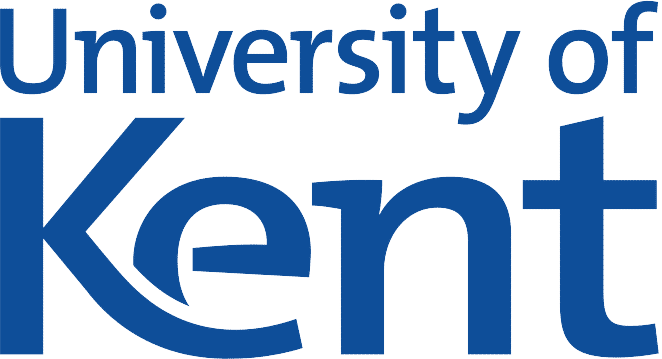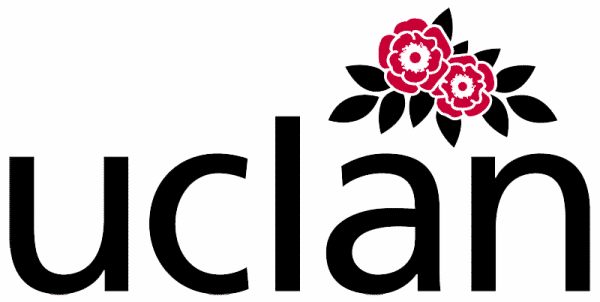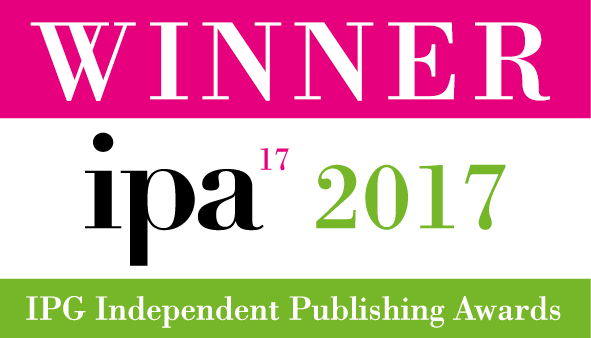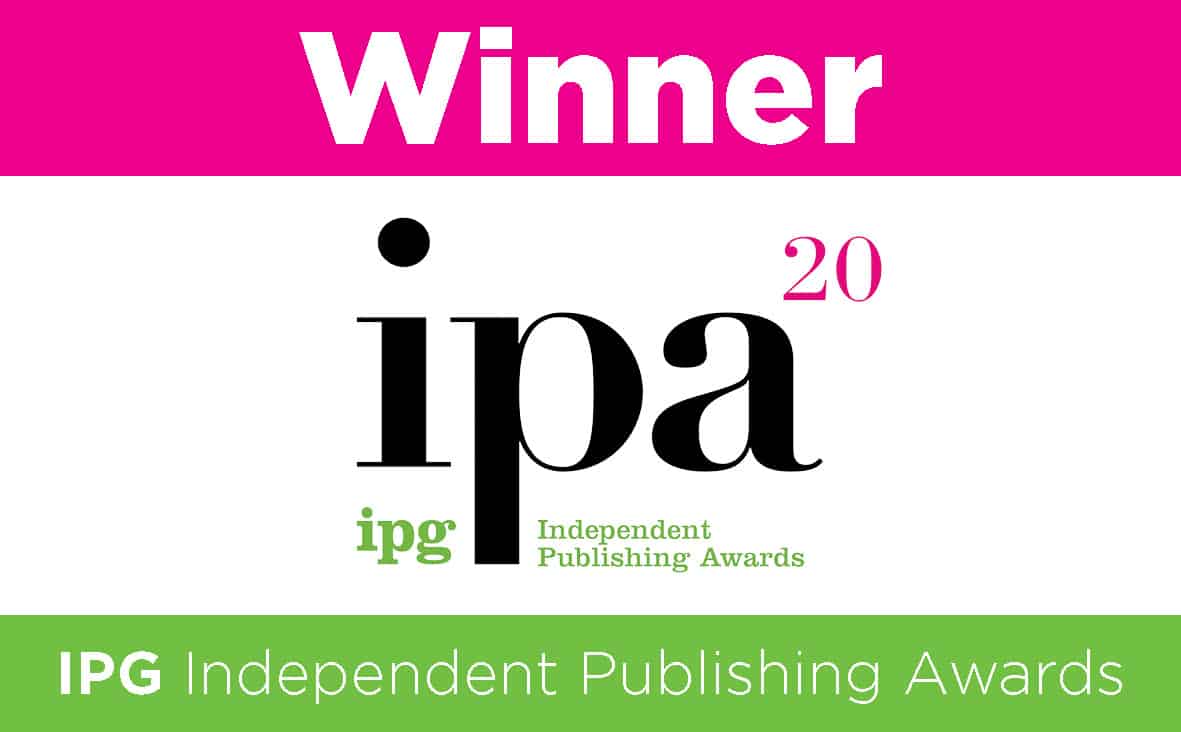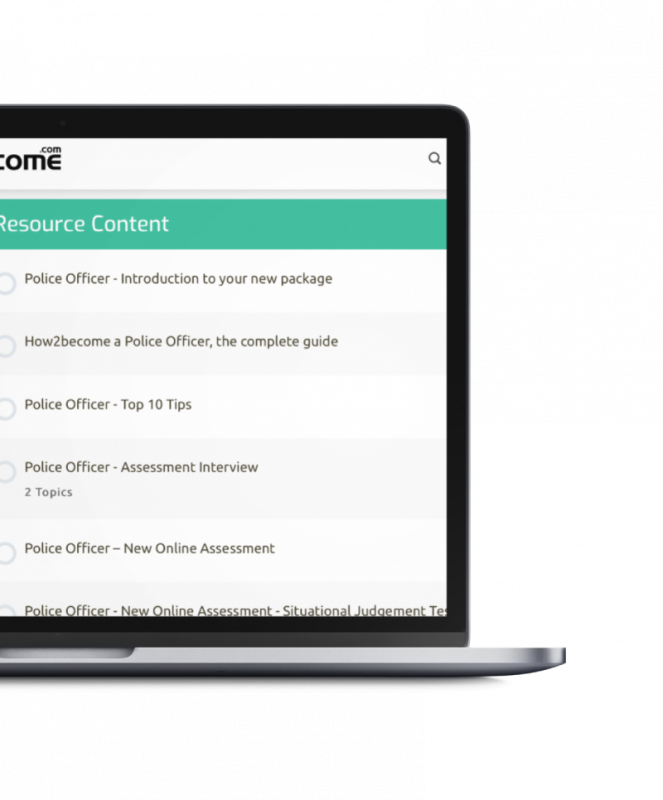
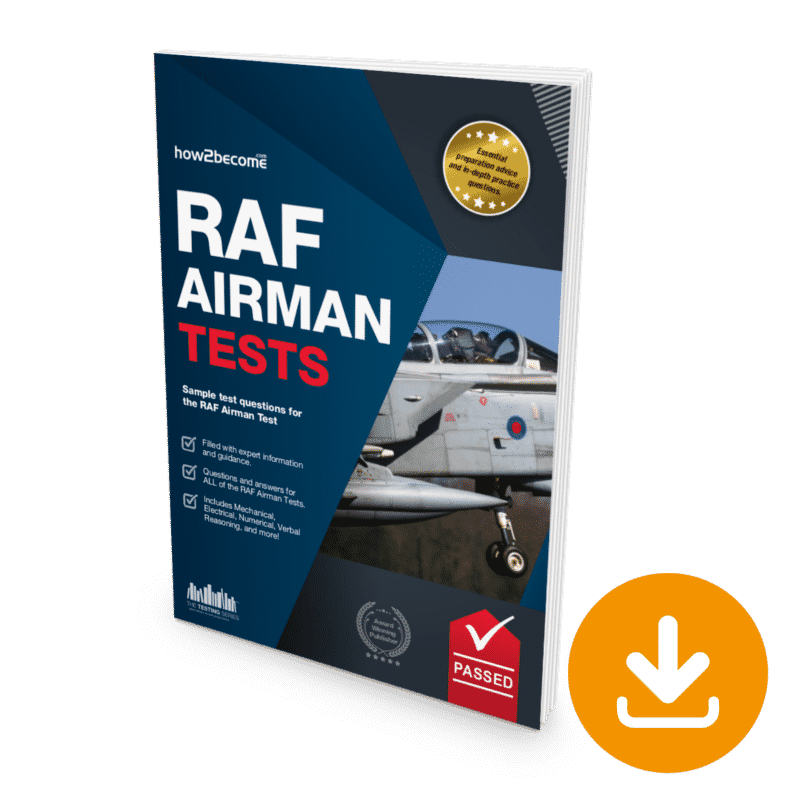
TEACHER INTERVIEW QUESTIONS & ANSWERS
Sample practice interview questions and answers proven to help you pass your teacher interviews first time.
Start Preparing Now 👉Worth every penny as it prepares for you the style and format of questions that you will be facing during the process of becoming a PC.”
TrustPilot
Practice Material That Works
Discover insider secrets and a masterclass of teacher interview advice and practice material that has helped 100s of candidates pass their teacher interviews.
Unlock Your Potential
Whether you’re just starting out or you know what to expect, you will get access to interview questions, which include excellent sample responses that will catapult your chances of success.
Powerful Resources
Get instant access to the material right now which includes all of the most up to date and expert advice for how to pass the teacher interview.
HOW TO PASS THE TEACHER INTERVIEW
When applying to schools or applying for initial teacher training, you will face many interviews. The teacher interview is particularly tough as it mixes both structured and competency based interview questions. Our complete guide contains:
- 50 sample interview questions and answers;
- A full breakdown of how to build your own answers;
- How you will be assessed – pass first time!
The teaching profession is now more varied than ever before. Modern teachers are more than just curriculum educators. They are role models, leaders and innovators; the first line of contact that our children have with a brighter and better future. With this in mind, it’s essential that schools are employing the right type of people for the job.
In our download guide, we’ll show you how to demonstrate that you ARE the perfect person for the role. We’ll cover a wide variety of interview tips and techniques, show you the questions that you are most likely to be asked AND provide sample responses to show you the best ways to answer them. By the end of our guide, you will be in a perfect position to ace your teaching interview, and secure your dream role.
THE STRUCTURE OF THE TEACHER INTERVIEW AND THE THREE MAIN ELEMENTS
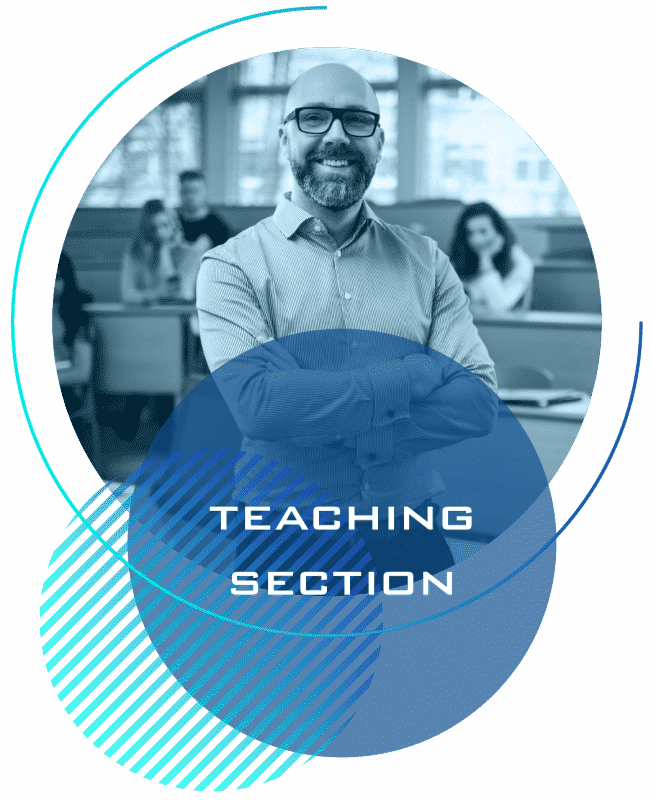
TEACHING SECTION
The first stage of the teacher interview is the teaching section. Daunting for some in this section, you will be asked to teach a full practice lesson. You’ll be informed about the subject material that you need to teach in advance of the interview, so that you can fully prepare. It is vital that in this section your lesson is researched and planned sufficiently, as there will be the added pressure of other senior teachers in the room assessing your teaching and organisation abilities, so preparation is key!
GETTING TO KNOW YOU SECTION
In the next part of the interview the assessors will ask you a number of questions in regards to your motivations for becoming a teacher. You will also be asked a number of questions in regards to your knowledge of the profession and whether you have any teaching background.
It is also imperative that you research the school you are applying to. The school website will be able to arm you with plenty of information you can use to impress the assessors.

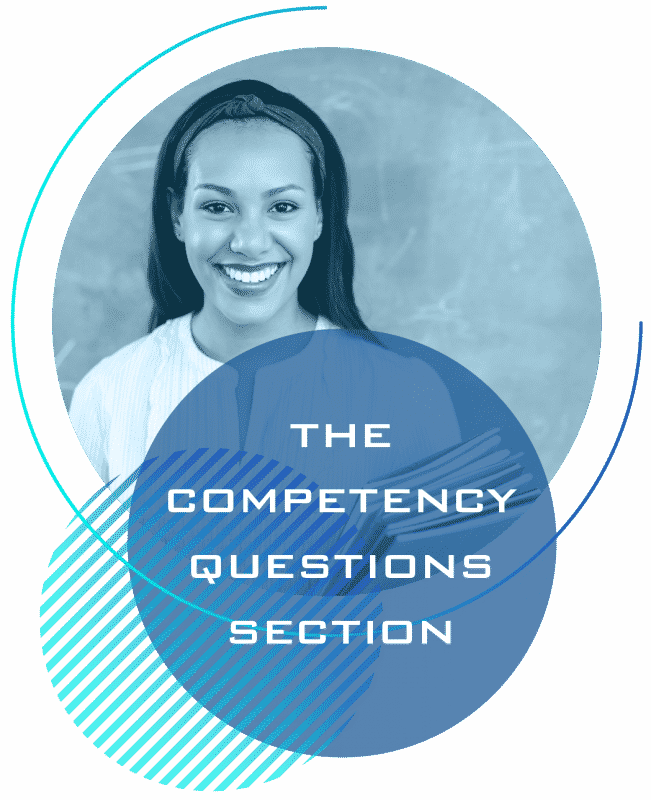
THE COMPETENCY BASED QUESTIONS SECTION
In this section, you will be asked questions surrounding the teacher core competencies, and your past experience of dealing with teacher related scenarios. It is vital to your success that you not only know these off by heart, you should also be able to easily recognise which of the competencies each interview question is referring to. This will allow you to understand a lot clearer what the interviewer is looking for and be able to answer with confidence and clarity.
How to Prepare for the Teacher Interview
Before you attend your teaching interview, it’s imperative that you have a sustained knowledge of the following topics:
- What a teacher does, their role in school, and their responsibility towards students.
- What a teacher at the school YOU are applying to does, their role in school, and their responsibility towards students.
- Your subject, and why it matters in a wider context.
- The core competencies/expectations of a teacher.
- The policies of the school that you are applying to.
You’ll be asked questions on all of these topics during the interview, so make sure you conduct a period of extensive research beforehand.
There are two invaluable resources for you here:
- Firstly, you can use the website of the school to find a list of the school policies, expectations and guidelines. School websites usually have downloadable newsletters and lists of any key accomplishments/awards they have received. Make sure you can bring knowledge of their history to the interview, because this will give you a crucial edge over other candidates.
- Secondly, there is the job description itself. In the job description, you’ll be given a list of requirements for the role. Make sure you pay close attention to these.
For example:
Lead and communicate with students on a daily basis.
- This is clearly indicative of the fact that you will need great leadership skills, and must be a good communicator.
- Communication can be broken down into listening and responding to students.
- Leadership can also be broken down into taking initiative, making difficult decisions and acting responsibly.
For further preparation tips, make sure you pick up a copy of our amazing guide!
Teacher Core Competencies
Now, let’s take a look at the teacher core competencies. The core competencies are a set of standards required for teachers. In this section, we’ll look at what these are, and why they will be essential in your interview.
One of the most fundamental skills for any teacher to have is good organisation. Organisation will separate the good teachers from the bad, and many people would argue that this is actually the most important competency. Without good organisation and time management, you will really struggle to succeed as a teacher. The most common complaint from teachers is that they just don’t have enough time to complete all of the tasks that they need to. Teaching is the ultimate time consumer!
You will become extremely familiar with lesson planning as you progress in your career. Lesson planning is absolutely vital. It will help you to stay organised, keep your classes on track, stay up-to-date with which classes still need to learn which material, and plan out every single day that you are teaching. The problem with this is that lessons don’t always go to plan.
In fact, it’s extremely rare for a lesson to go exactly the way a teacher wants it to. Classroom disruptions, overrunning discussions, and slow students are all issues that will take away from the chances of your lessons running smoothly. However, one of the great things about being a teacher is that no two days are the same. You will face a variety of different challenges, demands and questions on a daily basis.
Once you start planning lessons, you’ll really start to understand why your teachers used to get so frustrated with pupils who were disruptive.
As the teacher, you are the leader of the class. Students will look up to you and require guidance. You will also act as the authority figure for the group, so you will need to be able to live up to this role. It’s true that some teachers, when they start out, might struggle with this.
Leadership isn’t for everyone, and it’s often difficult to deal with at first. You might see yourself as a great teacher, but not necessarily a great leader. However, the reality is that the two go hand-in-hand.
Think about it like this; you want your students to learn from you and take on board the lessons you are teaching them. What is the best way to achieve this? The answer is to win their respect. If your students respect you, you’ll have a far easier time teaching them.
Why are these Competencies Important
Well, apart from showing you how you need to behave as a teacher, they will also be fundamental during the interview. As we’ve explained, the teaching interview is made up of 3 stages. The 2nd stage of the interview will not only test your knowledge of the competencies, but will also require you to demonstrate occasions where you have used these competencies in the past. For example, you might be asked to talk about a time when you have demonstrated your organisational skills. In the interview section of this guide, we’ll break down exactly how to do this.
For more core competencies, check out our fantastic guide!
Now, let’s look at some of the sections of the teacher interview in more detail.
Along with answering interview questions, many interviewers will also ask you to teach a practice lesson. This is so that they can assess how well you are actually able to teach, rather than how well you can talk about teaching! In many cases, the practice lesson will come before the interview itself. The reason for this is so that the interviewers can ask you questions based around your lesson. For example, you might be asked to assess how you felt the lesson went, and identify areas in which you struggled or were strongest in. While we can’t actually show you how to run a lesson in this book, we can give you some top pieces of advice for planning and executing your lesson to perfection.
Organising the room. The way your students are sitting in the room is really important. Very often, this can have a huge impact on the way in which the lesson pans out. Your seating plan should correspond with your teaching style. While you don’t want to be rearranging the classroom for every lesson, the way you intend to teach needs to match the organisation of the room. For example, if you are a teacher who uses large amounts of group work, then you need to have students sitting fairly close to each other, so they can collaborate effectively. You also need to be able to move around the room and interact with different groups yourself. You could also use the circle seating approach, which is becoming more and more popular. By placing students in a circle, the focus becomes directly on interaction with the group, rather than simply interacting with the teacher.
Interacting with the class. When speaking to the group, it’s essential that you are talking loud enough for the whole class to hear. As we mentioned in the organisation section, if students can’t hear or see you, they’ll become distracted and start misbehaving. Speaking loudly and clearly is also important because it allows you to develop a clear sense of control and authority. Obviously, yelling at the top of your voice won’t do you any favours, but you need to make sure that it’s clear that you can and will raise your voice if necessary. It’s also important that you don’t speak too quickly. This is a common problem, especially for newer teachers who are nervous.
Lesson Material. It’s essential that you keep your lessons interesting, and make sure your students are focused and on track. Generally, the older students get, the more focused they become. This means that if you are teaching younger age groups; you can expect to deal with more distractions (although this isn’t always the case!) This extends to talking and idle chatter too. Most teachers despair of this, but you can actually turn idle chatter to your advantage. Part of good teaching involves using real-life experiences as a platform for learning. Creating communication activities, where students can relate certain topics with ideas and situations from their own life; is a great way to minimise time wasted in the lesson.
The first part of your teacher interview will generally consist of ‘getting to know you’ type questions. What do we mean by this? Well, you’ll be asked questions based on:
- Your research into the position.
- Your personality.
- Your subject knowledge and understanding of what makes a good teacher.
Since you’ll be working with children, it’s essential that the interviewers can get to know you properly, before they make a decision on whether to hire you. The school need to be assured that you are a safe and responsible individual, who can provide great leadership to their students. Although you will need to pass a DBS check anyway to gain a position as a teacher, it’s important for the school to make certain beforehand.
They don’t just need to know that you are safe and trustworthy, but that you are reliable, hardworking, organised and able to cope under pressure.
Remember that when you are being interviewed for a teaching position, you aren’t just being interviewed for any job. Teachers aren’t just teachers; they are carers and role models, and therefore it’s essential that schools choose the right candidate for the job. The last thing that a school wants is to employ someone who will crumble under pressure when faced with a class full of students. With this in mind, they need to make sure that they have a personality that fits with the role.
Throughout this chapter, we’ll be showing you how to put this across in your answers. Our sample responses are aimed at helping teachers across any level. Whether you are a trainee applying for that first job or an experienced teacher, our answers are sure to help you.

PASS THE TEACHER INTERVIEWS WITH EASE…
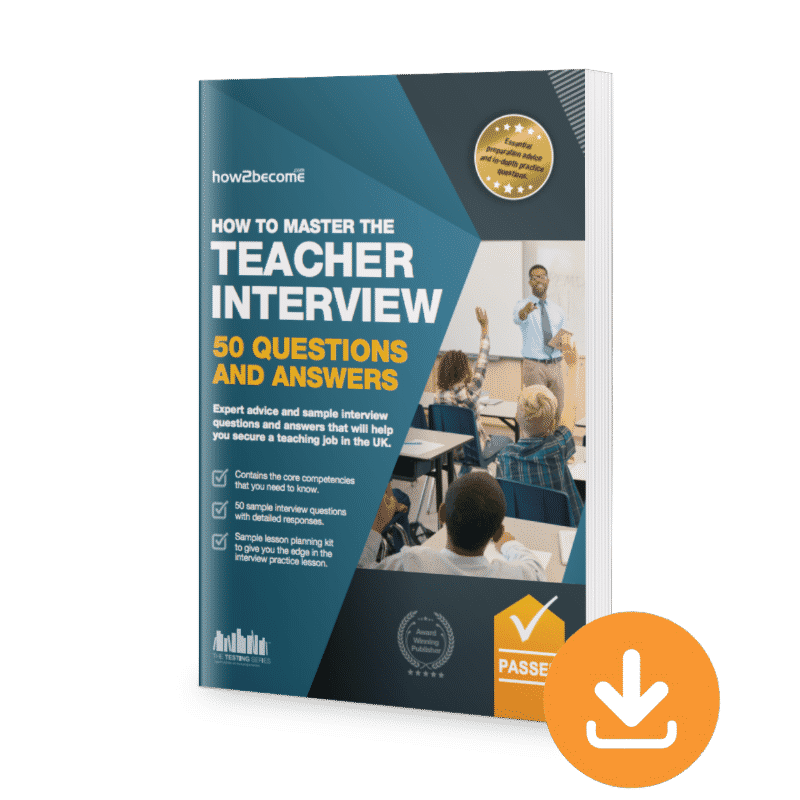
- A comprehensive overview of the 3 different interview sections, with tried and tested advice on each and every single one!
- Top tips on how to APPLY the core competencies to your responses!
- FIFTY sample interview questions and responses.
- 4 incredible chapters, designed to help you secure your dream career!
- Expert advice on how you can draft your own winning responses to ace your interview.

Pass the Teacher Interview First time.
Crafted for everyone, no matter your skill level or background, this workbook was made to help you achieve one goal: to pass your teacher interviews.
Scoring Criteria
Essential information about how you will be assessed during every stage of the selection process.
UP TO DATE FOR 2025
All questions have been verified by our interview panel experts..
PRACTICE THE interview with 50 sample questions and answers
Step-by-step information on how to pass the teacher interviews including sample answers to help you draft your own winning responses.
CAREFULLY CRAFTED RESPONSES
Sample responses for all interviewquestions so you can be confident in learning and improving your score.
INSIDER SECRETS
Insider tips on how to answer the questions and a breakdown on how you will be scored.
SCORE-BOOSTING STRATEGIES
Get ahead of the competition with unique and proven strategies 16 years in the making.
Sample Teacher Interview Questions
This gives you a chance to tell the interviewer about who you are as a person, what has led to your interest in teaching, and give some opening details about your skills and experience. It’s a common way for most interviews to start. Essentially, you need to sell yourself to the interviewer. This question can make a huge difference to the way in which the rest of the interview goes; you will want to set a professional and enthusiastic tone. Of course, first impressions mean a lot, so make yours count. Another important point to remember when it comes to answering this question is that you don’t need to just talk about yourself. You can expect to be asked questions on your knowledge of the school, but try to briefly link your personal qualities with those of the school. For example, telling the school that you are someone who has worked with a number of charities, and that you know they are keen supporters of various charities and trusts, will link your ethos to theirs. Schools want to hire someone who shares their values and believes in similar causes. Even at this early stage, showing that you have this quality will go a long way to securing the job position, and create a fantastic first impression.
Sample Response
‘I am a confident, enthusiastic and responsible person, with a genuine passion and desire for improving the education of young people. I myself have a great standard of education, and achieved high GCSE grades, A-Levels, undergrad and postgrad marks in my subject field – English Literature. I recently completed my PGCE teacher training, and now I am ready to move into the world of work. I believe that I am a great fit for a career as a teacher, and for your school. As a result of my PGCE training, I have picked up large amounts of experience in different school settings; including working in a special school for children with behavioural difficulties, and in various secondary institutions. I have also worked part-time as an English tutor for young people, on and off, for several years. All of this has taught me a great deal about how to conduct myself with integrity and professionalism, and how to impart my wisdom on others. I’ve conducted thorough research into your school, and was hugely impressed by what I have discovered. The learning style, ethos and range of extra-curricular activities that you offer are extremely appealing to me. I want to teach children that learning doesn’t have to be limited to the school environment; it can be something that they enjoy doing after school is finished. I believe that I am the right person to demonstrate this.’
This is a great question, and one that directly invites you to sell yourself. So, sell yourself! Another way of wording this could be: ‘what are your biggest strengths?’ The interviewer isn’t actually looking for you to tell them why they shouldn’t hire other candidates, or for special qualities that they’ve never encountered before. Let’s be honest, your answers and those of your competitors are probably going to overlap. Yes, everybody has different skills but unless you can juggle whilst standing on one leg, it will be extremely hard for you to show the interviewer something completely new (not that this would be relevant to the job role!) No, when answering this question you need to show how and why your skills and qualities are extensive enough for the position. The best way to do this is to demonstrate your skills via past examples. In your examples you should show that you have the ability to take things further and go the extra mile. This is what will distinguish you from the other candidates, and help you nail the answer to this question.
Sample Response
‘Great question. I believe that I have a number of qualities which set me apart from the crowd, and make me an ideal candidate to work in your school. Firstly, there is my level of teaching experience. While it’s true that I have only just finished my PGCE, I feel that the level of experience I picked up before and during this course is unique. Throughout my course, and prior to this, I went to great lengths to gain extra experience on top of what I was already doing. Coupled with a rigorous course, which involved numerous placements in school settings, I have also gone out of my way to gain other experience in schools. I spent extra time almost every single week in my school placements; wherever possible, learning from the staff and assisting students with extra-curricular learning activities. I assisted with both the Creative Writing and after-school English clubs, which were designed to help students improve the quality of their grammar and writing. Both of these assignments gave me a chance to interact on a one-to-one basis with students, and further my teaching skills. I found this extremely rewarding and believe it has greatly enhanced my teaching skills.
Secondly, there is my subject expertise. As someone with a PHD in English Literature, I believe that I am fantastically placed to deliver the curriculum material to your students. Teachers are role models, and who better to act as a role model than someone who has achieved top level marks from GCSE onwards? I feel that my age benefits me in this respect. As someone who is young and near fresh out of university, I will have no problem identifying and bonding with my students. For me, this is an essential part of successful teaching.
Finally, I firmly believe that my passion and drive to succeed in this role is unrivalled. I’m sure you’ll hear the same thing from other candidates, but I believe that my experience and history of taking initiative backs this up. I have always gone out of my way to excel and improve myself, and I would take the same attitude with this position.’
Sample Response
‘I’m aware of the fact that your school is so encouraging of creativity, and this is actually one of the reasons that I would love to teach here. I’m a very creative person myself, being an English student who is currently in the process of writing her own novel, and therefore I would absolutely welcome creativity with open arms. I know that some teachers in this country are scrutinised for ‘robotic’ approaches to teaching, and I really want to be a part of improving students’ creative and individual mindsets. As teachers, we should do everything that we can to encourage our students to think ‘outside of the box’ whilst still recognising that solutions can also be found ‘inside the box’, so to speak.
Throughout my training, I have done my utmost to get my students thinking creatively and in an original way about the subject. I actually feel that my own writing experience comes in really useful here, especially when analysing texts. One way that I like to introduce students to a new book is to ask them to draw character plotlines and write down their thoughts on the book. So, for example, if we’ve just started a book and been introduced to a specific character, I like to ask the class to write down their impressions of the character and what they think their motivations will be. We then compare this against the way the character is written. I’ve always found that this creates great discussion and really gets the group thinking about why things are written in the way that they are. Another exercise that I like to do is to ask the class to write a paragraph from a character in the book’s perspective. This gets them thinking outside of their own head, about other motivations, and the way that other’s think. I think this is great for stimulating the mind and encouraging creativity.
Overall, creativity is really important and I believe that it’s one of the most important qualities for us to foster.’
Sample Response
‘Very recently, when I was working in my current role, I had an issue with a teacher from another department. Every Tuesday morning, my Year 9 English group would arrive at least 10 minutes late for their lesson. After questioning the group on why they were always late, I was informed that their Maths teacher was keeping them behind every lesson; for misbehaviour and other reasons. This was extremely frustrating for me, and it cut out an important section of my lesson plan.
My first step was to try and encourage the class to behave in their Maths lesson. I fully understood that their teacher might have been frustrated, and I didn’t want to exasperate this issue by asking him to change the way he ran his lessons. Unfortunately, this didn’t work. Upon further questioning, the class admitted that they didn’t feel they had misbehaved and were unsure as to why the teacher was keeping them behind. I decided to tackle the problem head on. Without needing to be confrontational, I sent the teacher in question a polite email explaining the problem and asking him to try and get in touch to resolve it. The teacher in question responded back almost immediately, questioning the accuracy of my claims. I asked him to take a look at his ‘sign out-logbook’ which we used to show when a lesson was finished, to show that I was right. He then apologised wholeheartedly and informed me that he hadn’t realised his lessons had been overrunning, and would do his utmost to send his class out on time in the future. This fixed the problem, and my class were on time for the rest of their lessons.
I believe I acted professionally, responsibly, and with the right amount of restraint in dealing with this situation. I was polite at all times, and respected the needs of my fellow teacher in dealing with his classroom situation. We resolved things constructively, and this was to the benefit of everyone.’
Customer Success Stories
Having helped 1,000s of aspiring teacher candidates for over 16 years, it is no wonder our customers love us…
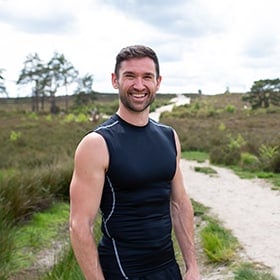
Well I passed the selection process and this gave me a real insight into what sort of questions / tests I may encounter. Would recommend as a preparation tool.

Big eye opener glad got it now have a headstart to reaching goal
GREAT BOOK.

I’m quite pleased with the content, it helped me a lot!- How2become customer.

I work at an FE College and have used the ideas in this book to support my students who are applying to be teachers. The book is very well structured and easy to access and use.

Examples of interview questions contributed to recent successful interview. The example questions and answers really helped me to prepare and plan for a recent interview as they made me think about relevant examples from my experience that I could use in an interview situation. – How2become customer.
Did you know? All orders with How2Become are protected by our 30-day money-back guarantee (see our terms for full details).

WHAT’S INCLUDED IN YOUR CAREER PACK?

- Lots of sample interview questions to help you get ready for your teacher interviews;
- Questions that are guaranteed to be very similar to the ones you will actually sit during the real interviews;
- A full breakdown of how to build your own answers;
- How you will be assessed – pass first time;
- Top tips on how to APPLY the core competencies to your responses;
- 4 incredible chapters, designed to help you secure your dream career!
- A comprehensive overview of the 3 different interview sections, with tried and tested advice on each and every single one!
- 50 Sample Questions and answers to help you draft your own winning responses.
PLUS…BONUSES!

BONUS #1
150-Page Interview Skills Insider’s Guide
FOR A LIMITED PERIOD ONLY we are able to give you our powerful 150+ page ‘Interview Skills’ guide free of charge. It is the perfect guide to help you prepare for the tough teacher interview!
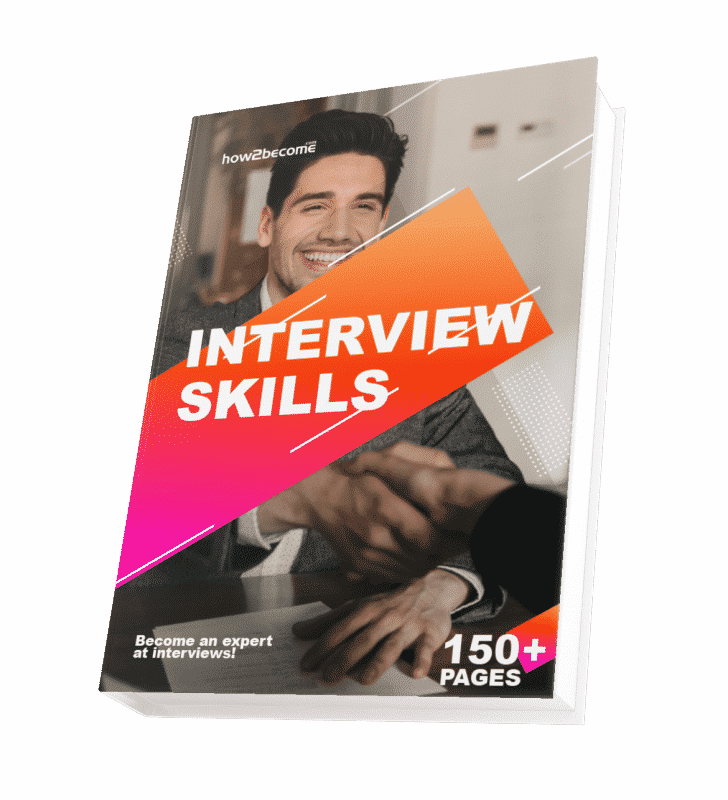
- All of the most common (and not so common) interview questions you are likely to face broken down.
- Full and detailed answers to every question – ensure you always have the perfect answer!
- How to use the STAR method to come up with your own winning answers that match the experience, values, and skills the interview assessor is looking for.
- Created by interview panel experts and packed full of insider advice.
Important: This insider’s guide cannot be purchased individually anywhere else and is exclusively available as a limited-time bonus!
Worth £9.99, Yours FREE
BONUS #3
PLUS…30-Day Free Subscription Trial To The Online QTS Testing Platform!
As well as life-time access to the Teacher Interview workbook, this product also includes a 30-day free trial to our updated QTS Testing Suite (usually £9.99+vat per month).
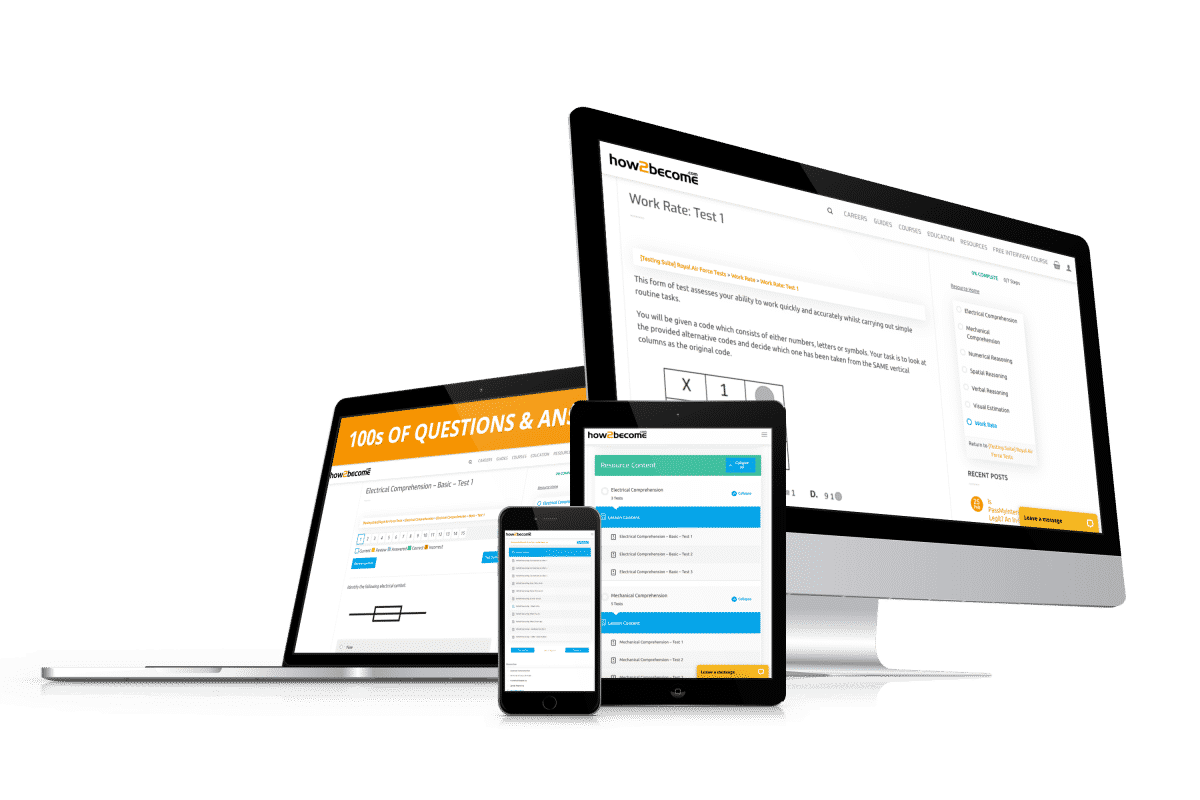
- 100s of Additional Questions on each element of the QTSto help boost your scores!
- Practice all of the test questions under timed conditions using our online testing suite.
- Instant online access.
- Compatible on Mobiles, Tablets and Computers.
- Scores are tracked so you can focus on areas that need improvement.
Important: This powerful free trial costs £9.99 + vat every month for everyone else! You will get unrestricted access to all of the interactive online police test questions to give you the advantage right away.
Worth £9.99, Yours FREE for 30-days*
*We want you to know: This is a subscription service that is charged at just £5.95 + vat per month after the 30-day trial expires. No minimum term. You may cancel anytime by contacting info@how2become.com. If you cancel before the 30-day trial ends, you will not be charged. Please see our terms for full details.

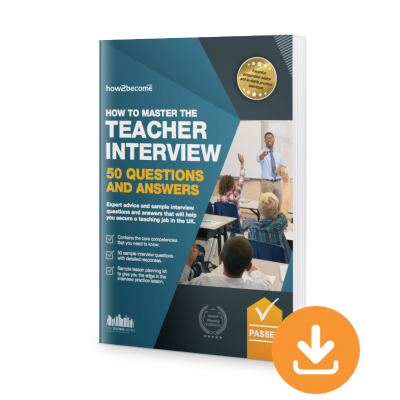
✓ 30-Day Money-back Guarantee
Did you know? All orders with How2Become are protected by our 30-day money-back guarantee. What ever the reason…or no reason at all…you can have your money back if this resource isn’t right for you (see our terms for full details).
WHY BUY WITH HOW2BECOME?
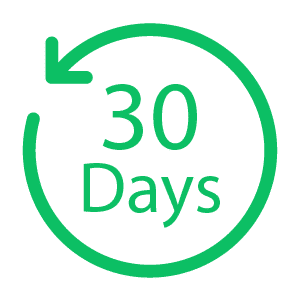
MONEY-BACK GUARANTEE
CREATED BY THE EXPERTS
PROVEN TRAINING
EXCLUSIVE FREE BONUSES
Firstly, these guides are created by us and our team of experts – we have all the answers to your questions and will help you succeed (like we’ve been doing for the last 16 years), we update our material frequently and you can contact us at any time with any questions you have.
Secondly, we provide exclusive bonuses with all our products that you won’t find anywhere else. These bonuses include free guides, powerful online testing suites and more!
Thirdly, our guides and training just work. Take a look at our TrustPilot page where you will see our rating of 4.9/5. There, our customers share their positive buying experiences and more importantly the time-saving success our resources have given them (hint: they passed their police interviews).
Finally, we have eliminated all risk for you. All of our online training resources are protected by our 30-day, no questions asked, money back guarantee. Whatever the reason…or no reason at all…you can have a full refund if this training isn’t right for you. So there is no risk.
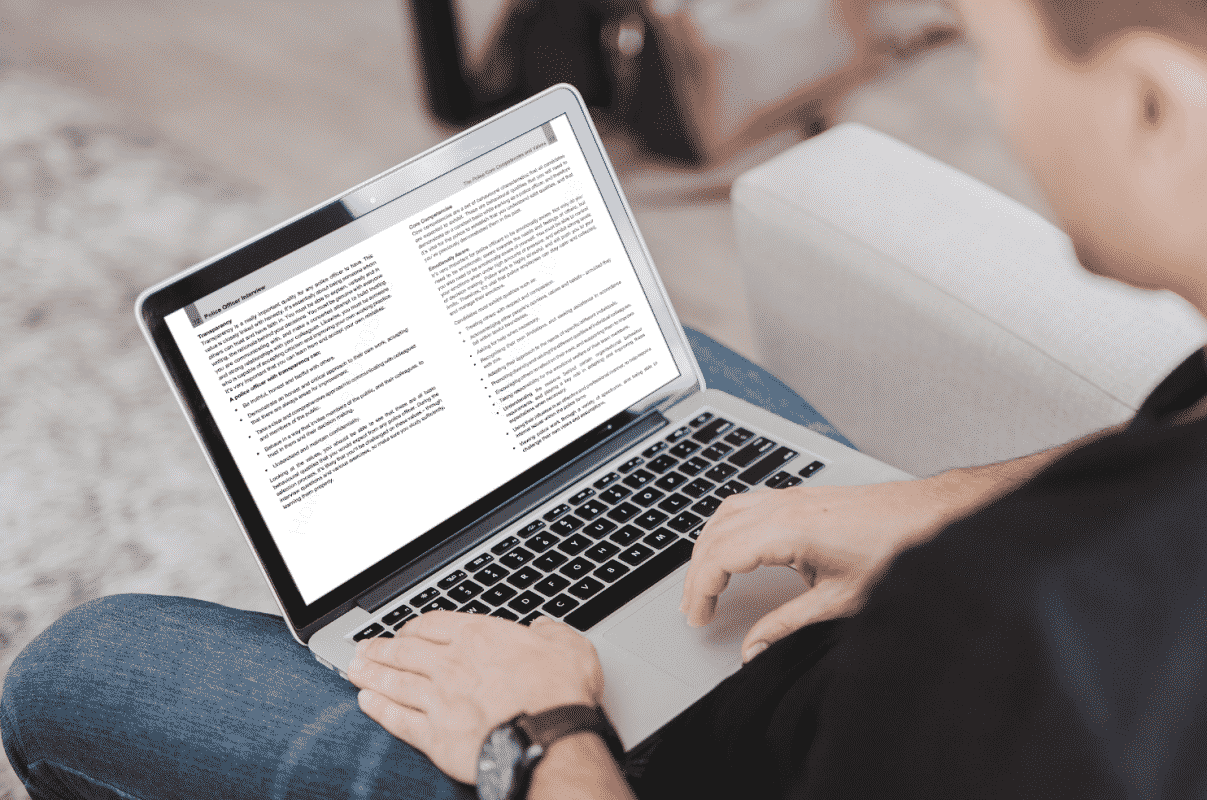
Learn how to PASS THE TEACHER INTERVIEWS
We’ve helped 1000s of aspiring applicants in their journeys to become teachers across the UK. Trust the UK’s #1 careers and education specialists to help you secure your role.
Get instant access »“Excellent book, this has really helped me to prepare for an upcoming interview.
Allows you to get an idea of what to expect on the day and calms the nerves, would highly recommend.” Alex P.

